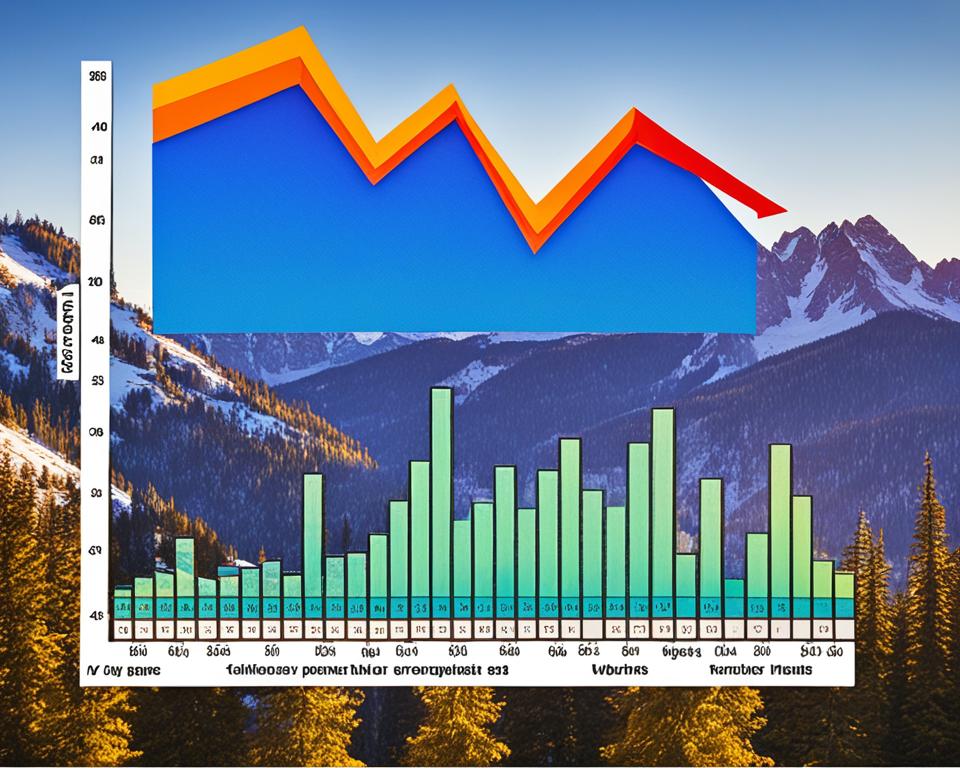The real estate market is always changing, full of ups and downs. To do well, you need to understand its complex nature. Whether you want to buy a home, sell one, or invest, knowing the real estate market well can help you make better choices.
There are many things that make up the real estate landscape. These include property size, location, and what it offers, as well as trends in supply and demand and the economy. By looking at these factors, people and businesses can make smart decisions. Keeping up with the latest trends and conditions is key to doing well in real estate, whether you’re buying, selling, or investing.
Understanding Real Estate Market Analysis
Understanding the real estate market can be tough, but analyzing it deeply helps. This method, known as comparative market analysis, is key for buyers and sellers. It helps set the right price for a property.
Property Size, Location, and Amenities
At the core of market analysis is looking at a property’s size, location, and amenities. Experts use these to find similar properties and set a fair price range. This helps buyers make smart choices and sellers set competitive prices.
Supply and Demand Trends
Market analysis also looks at the big picture, like supply and demand. By tracking property inventory, sales rates, and buyer interest, analysts spot trends. This helps real estate pros stay ahead in a changing market.
Economic Indicators and Regulatory Environment
The market is shaped by big economic factors and rules. Analysis looks at things like job rates, inflation, and mortgage rates, plus policy impacts. This helps experts make better decisions and advise clients well.
Knowing how to analyze the real estate market helps people make smart moves. It lets buyers and sellers reach their goals in the market. This detailed approach gives confidence and insight.
Examining Property Value Fluctuations
The real estate market is always changing, with property values going up and down. It’s important for buyers, sellers, and investors to know what affects these changes. Many things, from big economic trends to local market details, play a part in how property values change.
Macro-Level Influences
Big economic factors can really change property values. Things like job rates, GDP growth, and how confident people feel can be key. Changes in population and how households are made up can also shift housing demand. Plus, government policies, like interest rates and tax breaks, can affect the market and property values.
Micro-Level Factors
Looking closer, the value of a property can be influenced by its own features and the local market. Things like the property’s condition, size, and what it offers can matter. The area it’s in, with its schools, crime rates, and infrastructure, also counts. And the balance of supply and demand in a market can change property values as buyers and sellers react.
Knowing how macro and micro factors work together helps real estate pros and investors make better plans. It’s important to keep up with trends and changes to make smart choices and grab opportunities in the real estate market.

“Successful real estate investment requires a deep understanding of the factors that drive property values. Staying up-to-date on the latest trends and analysis can help you make informed decisions and maximize your returns.”
Interpreting Housing Market Forecasts
Understanding housing market forecasts is key to making smart real estate moves. These forecasts predict market trends, helping people know if property prices will go up, stay the same, or drop. They look at many things like the economy, real estate trends, and new tech.
For those looking to buy a home, these forecasts are a big help. They show the best time to buy. Sellers can use them to sell at the right time and get the best price. Investors can spot good investment chances or sell if the market looks bad.
Key Factors Influencing Housing Market Forecasts
Many things affect housing market forecasts, including:
- Economic indicators like job rates, GDP, and interest rates
- How much people want to buy and sell homes
- Changes in population and new households
- How easy it is to get loans and what mortgage rates are
- Government rules and policies on housing
- New tech and its effect on real estate
Experts look at these things to make detailed housing market forecasts. These forecasts help with smart property investment decisions and understanding real estate market trends.
| Economic Indicator | Impact on Housing Market Forecast |
|---|---|
| Unemployment Rate | High unemployment means fewer people can buy homes, so demand goes down. |
| Mortgage Rates | When mortgage rates go up, buying a home gets harder, which can slow down the market. |
| Inflation | High inflation makes buying homes harder because prices go up, slowing down the market. |
Knowing what affects housing market forecasts helps people make better choices. It makes navigating the real estate landscape easier.
“Accurate housing market forecasts are key for good property investment decisions and staying on top of the real estate market.”

Navigating the Real Estate Landscape and Property Market Trends
Understanding the real estate market is key for buyers, sellers, and investors. Knowing what drives the market helps you make smart choices. This includes supply and demand, economic trends, and what people want.
Supply and demand are crucial in real estate. They affect property values and rental rates. Knowing how many properties are available and how many people want them helps you understand the market.
Economic factors like jobs, inflation, and mortgage rates also shape the market. These can change how people can afford homes. This, in turn, changes how buyers act and the market moves.
New trends, like smart homes or eco-friendly properties, also play a role. Keeping up with these trends helps you spot new chances. It lets you adjust your plans to fit what buyers and renters want.
To sum up, understanding real estate means looking at many things. Look at supply and demand, economic trends, and new trends. This way, you can make better choices and succeed in real estate.
| Key Factors Influencing the Real Estate Market | Impact on Buyers and Sellers |
|---|---|
| Supply and Demand | Affects property values, rental rates, and market activity |
| Economic Indicators (Employment, Inflation, Mortgage Rates) | Impacts affordability and buyer behavior |
| Emerging Trends (Smart Home Technology, Eco-Friendly Properties, Remote Work) | Shapes the evolving needs and preferences of buyers and renters |
Knowing these factors and trends helps real estate pros and investors make better choices. It gives them confidence and success in the market.
Economic Indicators in Real Estate
Economic indicators are key to understanding the real estate market. They show how healthy the economy is and where it’s headed. This affects real estate trends and property values a lot. Important indicators include employment data, inflation rate, and mortgage rates.
Employment Data
When more people have jobs, they feel more confident about buying big things like homes. This makes them want to buy properties, which can push up prices. This is good news for homeowners and investors.
Inflation Rate
Inflation can really affect real estate too. If prices go up a lot, people’s money doesn’t go as far. This makes loans for homes more costly. So, fewer people can buy homes, which slows down the market.
Mortgage Rates
Mortgage rates are super important for real estate. Low rates make it cheaper to borrow money for a home. But when rates go up, owning a home gets pricier. This might stop some people from buying, which can slow down the market.
Knowing about these economic indicators helps everyone in the real estate world. From buyers and sellers to investors and real estate pros, it helps them see what’s coming. This way, they can make better choices and move through the changing real estate scene.
| Economic Indicator | Impact on Real Estate |
|---|---|
| Employment Data | High employment rates stimulate real estate demand, driving property prices upwards. |
| Inflation Rate | High inflation can erode the purchasing power of consumers, making home loans more expensive and cooling the real estate market. |
| Mortgage Rates | Low mortgage rates make borrowing more affordable, while high rates can price out prospective buyers and slow down the market. |
“Understanding the relationship between economic indicators and the real estate market is crucial for making informed decisions in the ever-evolving property landscape.”
Real Estate Investment Trends
In the world of real estate, knowing the latest trends is key for smart investors. These trends show how investors are adapting to new economic changes, tech, and market shifts.
Sustainable real estate investing is on the rise. More people want green buildings that save energy and are good for the planet. This shows a big move towards caring for the environment and seeing the value in sustainable properties.
Investing in suburban areas is another big trend. With more people working from home, many are leaving city life for quieter suburbs. This change means new chances for investors to make money from suburban homes.
Property technology, or “proptech,” is also changing real estate. It uses tech to make real estate work better, from managing properties to analyzing investments. Investors who use proptech can get ahead with its efficiency and smart data.











